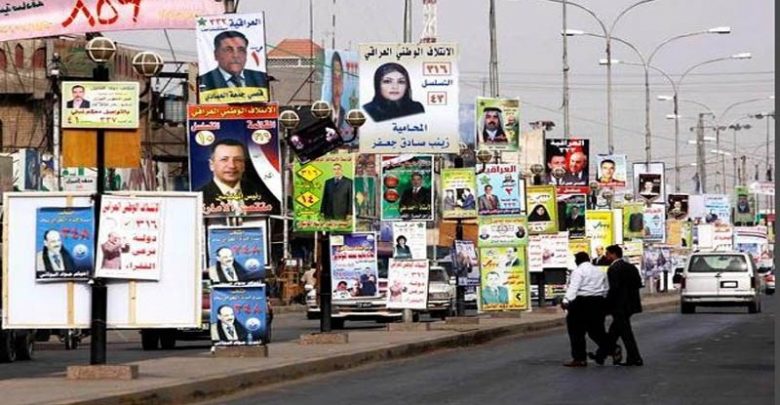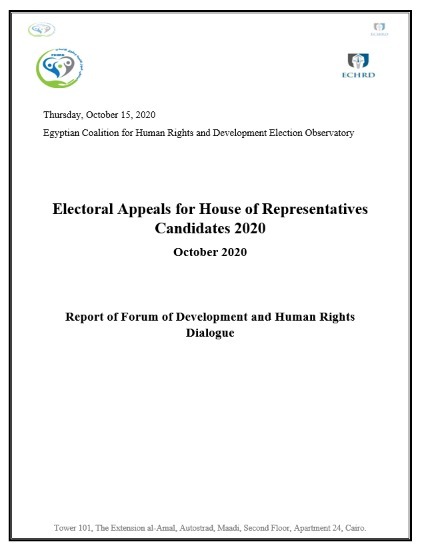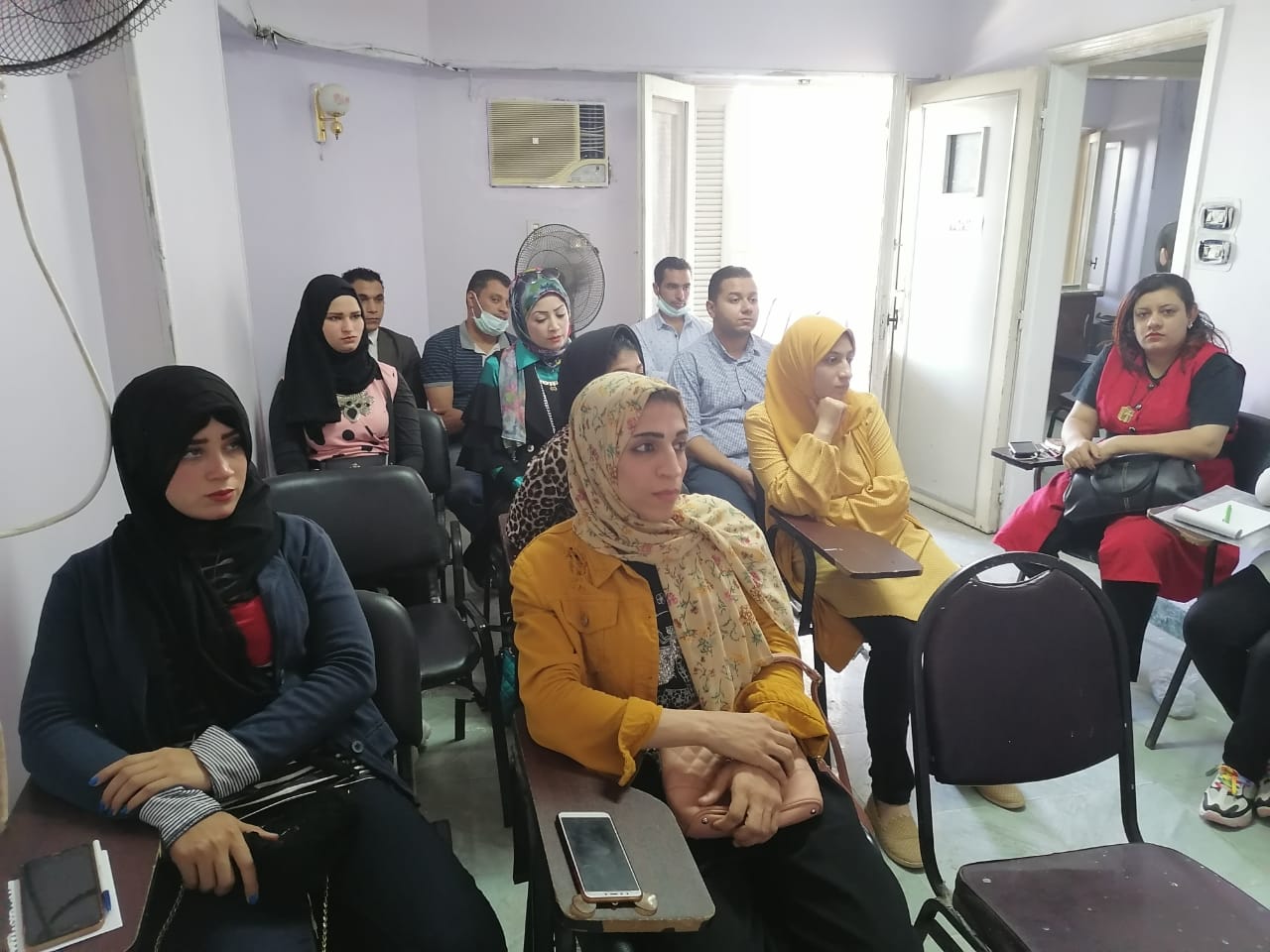Sunday 18th October 2020
Press Release
Electioneering: Pros & Cons
State Institutions have neutral situation with all and candidates violate decisions of the National Elections Commission
Social media websites and electronic advertising lead the scene and a remarkable decline of banners and publications
In cooperation with the Forum for Development and Human Rights Dialogue, the electoral observatory of the Egyptian Alliance for Human Rights and Development is issuing today a report entitled “Monitoring the Stage of Electioneering of Parliament Candidates 2020”.
The report highlights the regulations of electioneering of parliament candidates which have been put by the National Elections Commission. These regulations include the electioneering duration, the maximum expenditures, how to get donations, bodies from which donations are prohibited, monitoring expenditures and regulations of advertising account. As for the timetable of the parliament elections, the report reveals that the period of electioneering for first-stage individual and list candidates is ending today 18th October 2020 at 12:00 PM which started on 5th October 2020, while the period of electioneering for second-stage candidates will start on 19th October 2020 and will last till 1st November 2020 when the electoral silence period is starting.
In regard to the manifestations of parliament electioneering 2020, the report points out that a significant number of candidates have what can be called “sportsmanship” which is a remarkable phenomenon of this electioneering. This sportsmanship has been manifested as some candidates welcome the nomination of other candidates or that they feel sad when a candidate withdraw or is excluded. In addition, the spirit of personal hostility between competitors is absent along with hostile actions and deeds which appeared in previous electoral campaigns such as candidates who tear each other’s banners.
Moreover, according to the report, the Egyptian governorates is witnessing a remarkable development in promotion means for parliament candidates in addition to the prevailing promotions through screens instead of cloth banners and depending on social media websites increasingly. On the other hand, usual promotion and advertising ways are still playing their roles especially in faraway areas in some constituencies.
On party level, the report reveals that political parties are still supporting their candidates whether for individual seats or lists through field meetings, presenting electoral programs, activating social media platforms to communicate with youth and listen to their problems and requests.
The report concludes that in the context of monitoring and following up the electoral environment by the parliament election observatory of the Egyptian Alliance for Human Rights and Development, phenomena of positive and passive electioneering in some governorates; the most prominent of which are:
Firstly: passive phenomena
- In a precedent (the first of its kind) after the president Al Sisi came into power, one of the candidates turned aside from the ordinary as he merged policies with religion in one of his electoral conferences; the matter which was met with status of anger on social media website Facebook. The candidate took one of Sheikhs and Priests wearing Islamic and church costumes to support him in parliament elections. This matter was rejected by political followers announcing their complete rejection of merging policy with religion saying “Be moderate, God bless you”. Facebook users assures through their pages that laws and regulations of Al Azhar and church states not to engage in policy.
- Early promotion banner which spread all over most governorates which distorted its aesthetic view and arouse the anger of people in some areas.
- Some candidates violated regulations of electioneering defined by the National Elections Commission as some campaigns made use of school, mosques and governmental institutions’ fronts in some cities and villages in promoting for their candidates; the matter which faced by councils in cities and villages by removing this kind of advertisements and promotions.
- Public conferences for some parties have been monitored especially Mostakbal Watan Party and Al Shaab Al Ghomhory Party before the official starting date of electoral campaign.
- Some of individual candidates in some constituencies pay some of reconciliation fines in regard to violating buildings.
- Mostakbal Watan Party has announced the payment of reconciliation fine for violating buildings according to reconciliation law for 27.000 people distributed all over governorates.
- Some electoral bribes have been monitored represented in distributing supply bags to some NGOs in addition to establishing fairs for selling school materials at low prices. In addition, bribes included promises of providing job opportunities in companies owned by some potential candidates.
- Worship places have been used to hold meetings with voters inside their constituencies. This kind of electioneering focused in villages and the poorest areas in cities.
- In the first stage of parliament elections, debate between one constituencies candidates was absent through which the electoral programs of candidates are presented in addition to their political visions especially parties candidates. So debate is important where candidates can present their different political and thought visions since debate aims mainly at providing an opportunity for all to present his/her vision to voters as people can evaluate candidates and their electoral programs. Also debate provide an opportunity of discussion and clarifying parties plans and their political vision to serve public work in general and citizens in particular which is positively reflected on citizens’ lives on the long run and determined their choices in the coming elections.
Secondly: Positive Phenomena
- What is done by local councils in most governorates of removing all advertising and promotion done by candidates and their supporters before the official starting date of electoral campaigns in addition to reporting them and imposing fines on them.
- What is decided by Discipline and Values Committee at the Ministry of Endowments to release Sheikh Abo El Fottoh Abd El Rasheed Abd Allah (following up inspector in Endowment Directorate of Al Daqahlia) from his work and return him to be Imam and teacher and transfer him to work in Endowment Directorate of Damietta as he participated and existed in the office of one of the parliament candidates in contradicts with his job duties.








